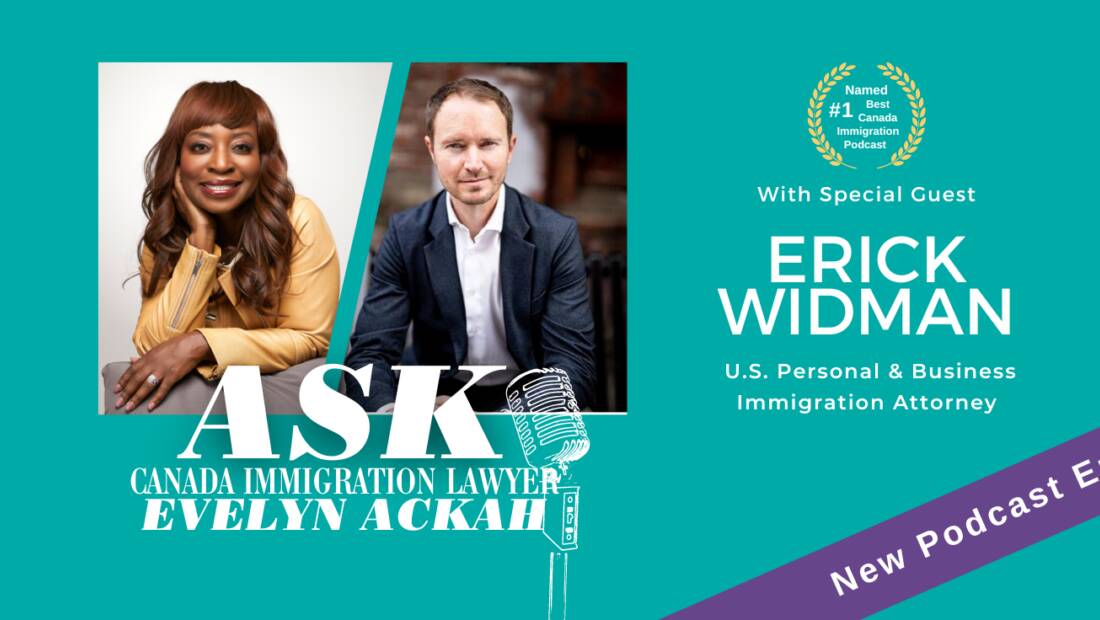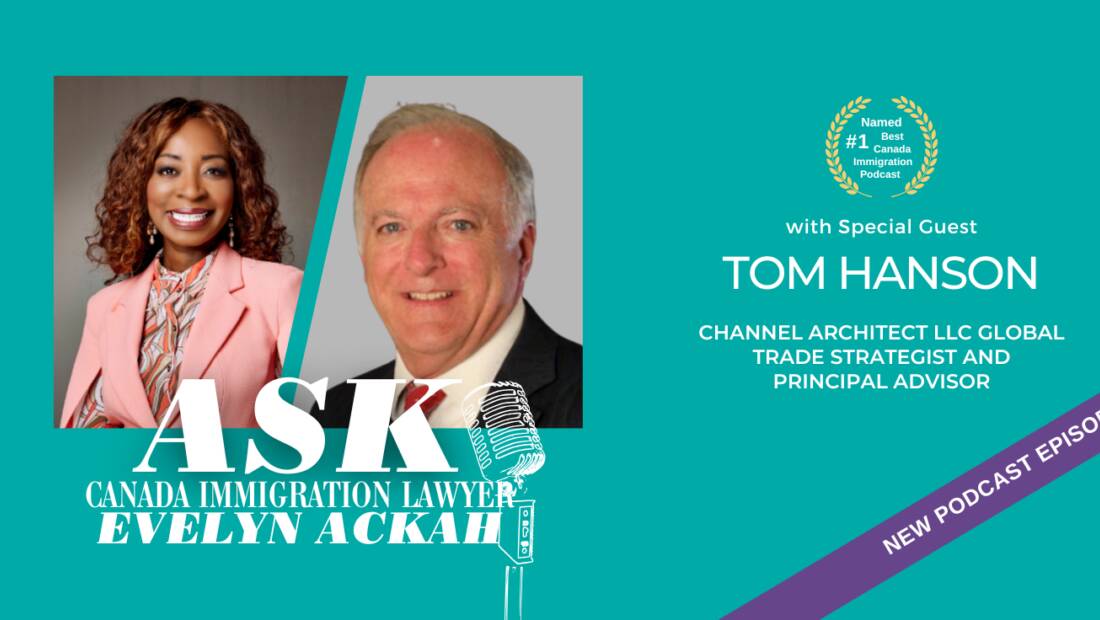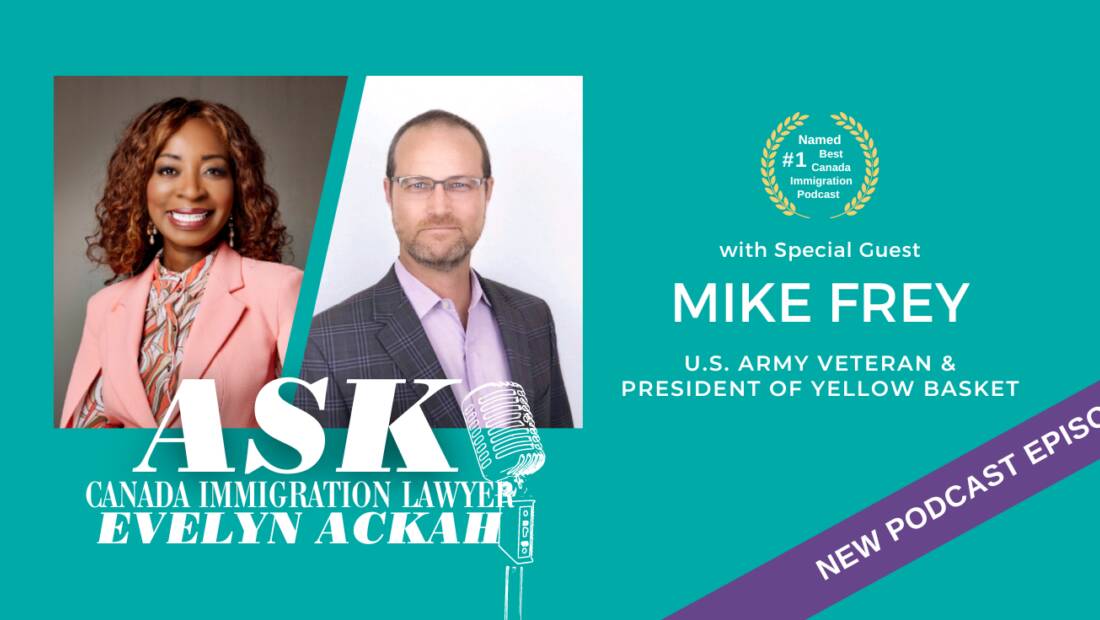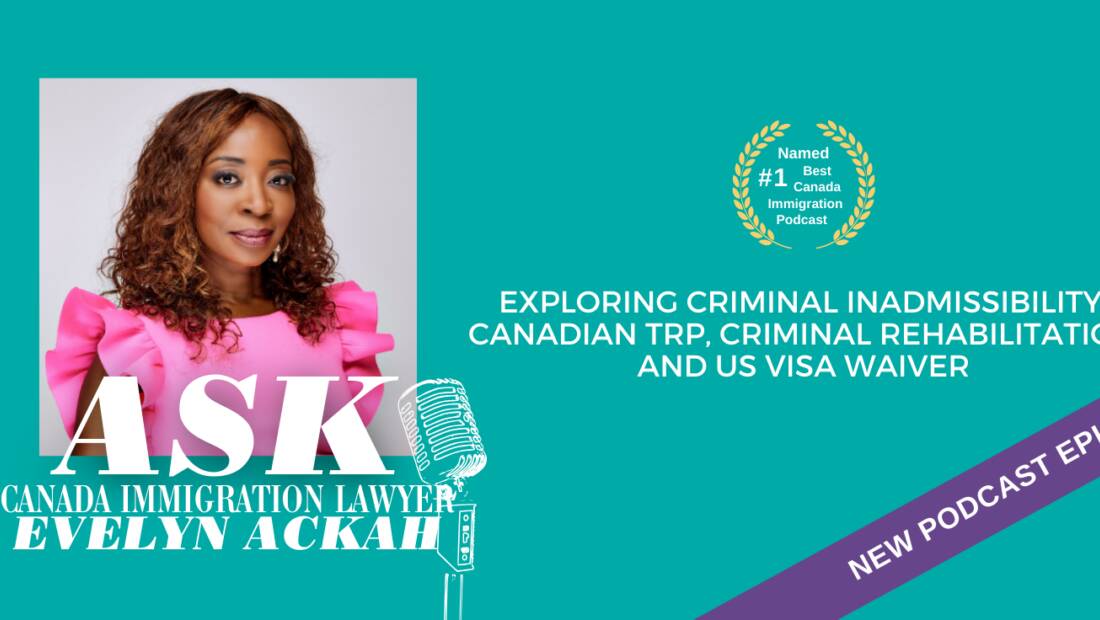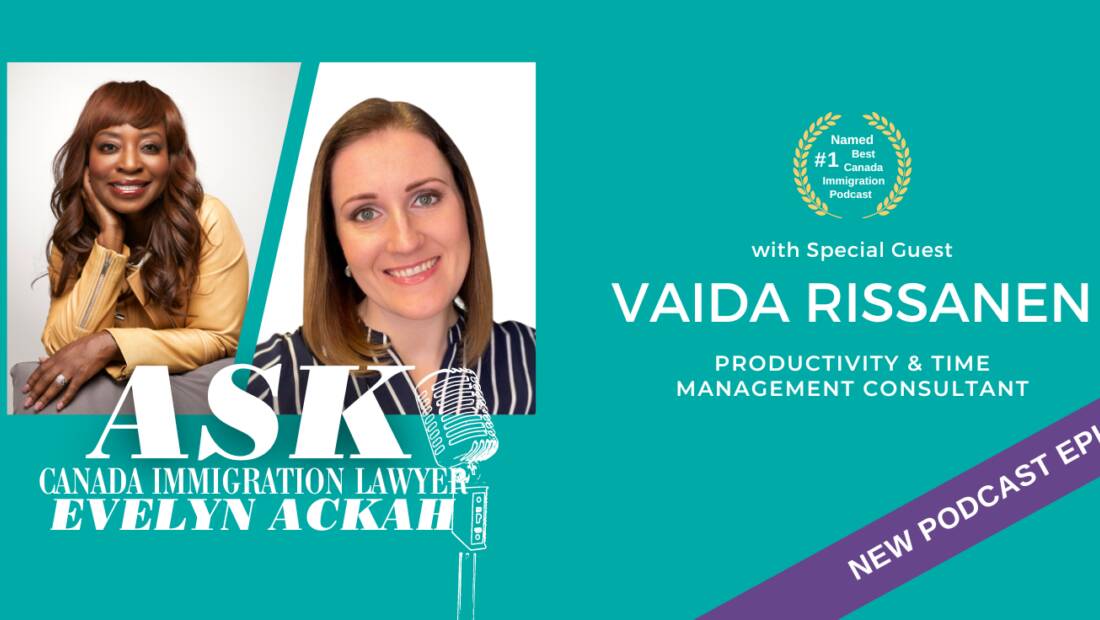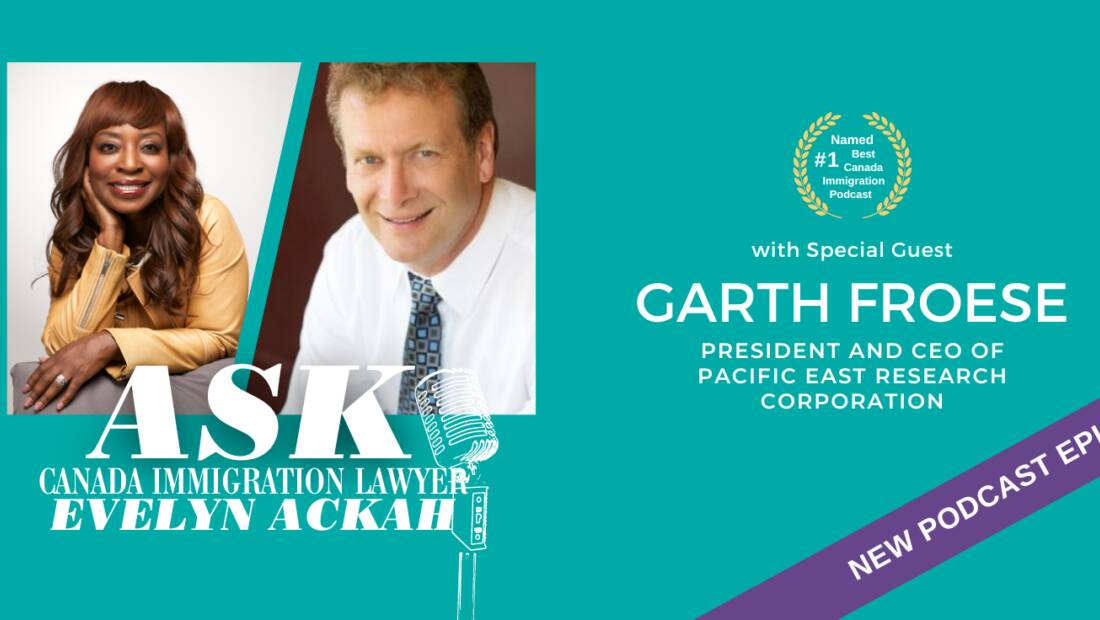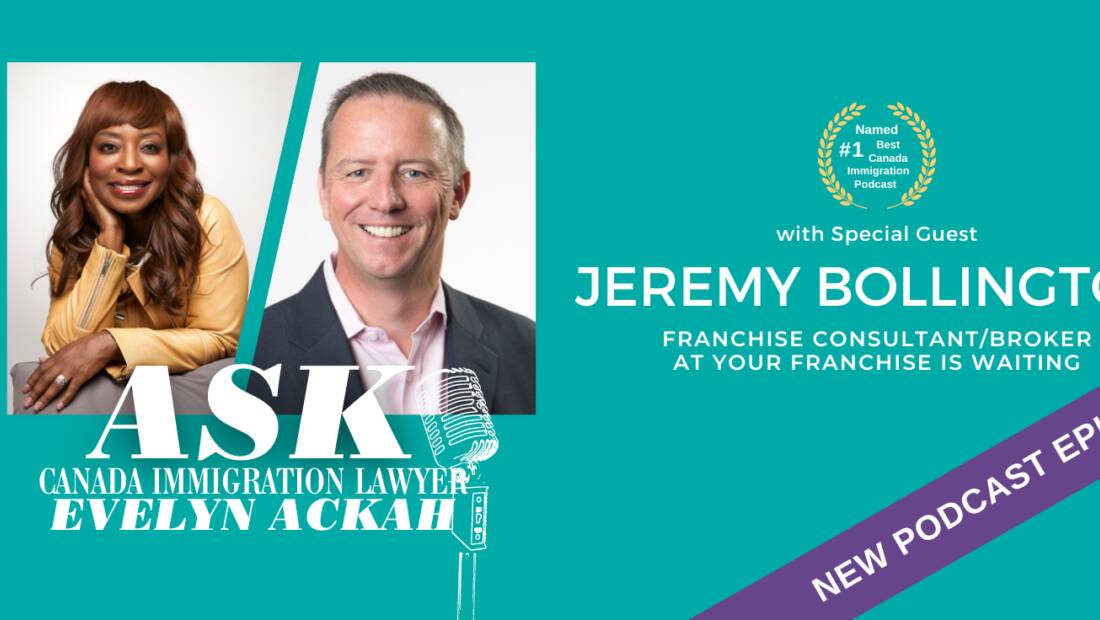Or listen on your favourite podcast app
Calgary immigration lawyer Evelyn Ackah spoke with Erick Widman, a Portland immigration lawyer who experienced all sides of immigration: he began as an American expat living and working in Budapest, Hungary, then helping his Hungarian wife immigrate to the United States and become and naturalized citizen, and now as the Founder and Managing Attorney of Passage Immigration Law, where he helps others navigate the immigration journey. Erick practices both business and immigration law and his firm's “why” is to enable people to achieve their full potential by living globally.
BOOK YOUR FREE CASE EVALUATION
Live Globally and Help Others Live Globally
As a former immigrant himself and a parent to 3 multicultural, dual citizen children, Erick's mission is to live globally and help others live globally. Evelyn and Eric discuss:
- Why Passage Immigration Law - why did you choose that name for your law firm?
- Like me, you practice both business and family immigration law. What do you see as the biggest differences between a business law practice and an individual - and why do you choose to both practice areas?
- As an American who immigrated to live and work in Hungary, what did you learn about being an expat yourself that helps you today as an immigration lawyer?
- How was your immigrant experience different than your wife’s, who immigrated to live permanently in the United States, while you returned to the US after a few years?
- Have your kids lived in Europe, or only visited?
- How do you raise children with a global mindset, versus a border mindset?
- What is your biggest frustration with the U.S. immigration system?
- How does your law firm manage the challenges and roadblocks immigrants face?
- Why do you think some Americans are so resistant to immigration?
- What do you say to Americans who strongly oppose immigration?

About Evelyn Ackah
Evelyn Ackah is the Founder and Managing Lawyer at Ackah Business Immigration Law. We work with individuals and business owners from all over the world who want to cross borders seamlessly. For more information on immigration to Canada or the United States, Ask Evelyn Ackah at Ackah Business Immigration Law today at (403) 452‑9515 or email Evelyn directly at contact@ackahlaw.com.
The Ask Canada Immigration Lawyer Evelyn Ackah podcast by Calgary Immigration Lawyer Evelyn Ackah was named #1 Best Canada Immigration Podcast in 2022 by Feedspot.
BOOK YOUR FREE CASE EVALUATION
Transcript
Evelyn Ackah:
Good day, everyone. This is Evelyn Ackah from the Ask Canada Immigration Lawyer podcast. I have the pleasure today of welcoming my friend and colleague, Erick Widman, who is the founder and CEO of Passage Immigration Law based in Oregon.
Welcome, Erick.
Erick Widman:
Thank you so much, Evelyn. It's a real pleasure to be here.
Evelyn Ackah:
Well, I'm thrilled to have you. I mean, we've been seeing each other at workshops and we're both focused on growing and developing personally and professionally, so I thought it would be great to have you join our podcast because you are a US immigration lawyer, and I'm Canadian, and so I wanted to talk about your background and why you got into immigration law, but maybe the first question is tell us a little bit about you and your background.
Erick Widman:
Yes. Well, I am originally from Northern California, grew up in Silicon Valley in a very diverse area where White people are actually the minority in my public high school. That was great. Another formative experience for me was going to Japan as a junior high middle school exchange student. I lived with a family there for a month, and that opened my eyes to all kinds of new horizons, and that encouraged me, for example, to study international issues in college at UCLA and then went to law school in Northern California at Davis, and the best choice I ever made, I think, I encourage everybody to do this, is live overseas, live abroad somewhere.
I lived in Hungary and I taught law in Budapest, and not only did I have an amazing cultural experience where I was able to serve and give, but I met my wife there. We have been married for 21 years now. We have three dual citizen kids. Yeah, that's the overview there, and I started my law firm 12 years ago and moved from Northern California to Portland, Oregon.
Evelyn Ackah:
Oh, I love Portland so much. I mean, being from Vancouver, we were down in Washington State, in Portland on a regular basis in Oregon. It's beautiful. I love the story you tell about the importance of traveling and being abroad because I feel like that's been my experience, too, is the more you travel, the more you realize we're all the same, and you also realize that we're all dealing with the same issues, and it just makes you more worldly. I mean, for the work we do, we're talking to people with different accents and from different countries all the time.
Tell me why you called your law firm Passage Immigration Law, Erick.
Erick Widman:
Yes. Well, when I originally created the firm, it was Widman Immigration because I felt like all law firms should go that direction and, hey, that's fine. You're tying your personal brand, obviously, and your reputation to the law firm. I was inspired from several different examples to go with Passage. It was hard finding a good word. I thought of naming it after my daughter actually, Petra Law Firm, but it was already taken online by another law firm, and Jordan. We do have the trademark for Passage, but I love the idea of moving from one place to the next, obviously, passing one to the next, but also moving from a place of uncertainty to confidence, so both physical, but mental and confidence level, too.
Evelyn Ackah:
That's awesome. Erick, like me, you practice business and family immigration. Can you tell us a little bit about your practice areas and what you focus on and who you can help the best?
Erick Widman:
Yes. When I first started my firm, I was an in-house lawyer initially at Phillips Electronics in Silicon Valley. I helped our business and also our subsidiaries, and so there's definitely a business emphasis there, but I was living in international marriage, and so, when I started my firm, a lot of the clients that naturally were attracted to me and I can connect with were others, typically Americans, who had met a foreign national somewhere maybe in the US or abroad. I've always been able to connect with them because I think it's the coolest thing, and one of the richest things you can do is get into an international marriage. It has its additional challenges, but I love interacting with couples like that. Many of our friends are also international couples with almost like a dual citizen, bicultural.
Evelyn Ackah:
Wow. Wow. Is that the primary area you work in? Do you do any of the corporate immigration or is it mostly the family reunification and the family sponsorship type of immigration law?
Erick Widman:
We're about half and half. Since my roots are business and corporate, we've always kept that up, and then the practice grew a fair amount with family-based clients over the last 10 years, but we're probably at this point 40% business clients, employers, and individuals, of course, looking for different options for themselves, and longer term I see us moving into having more and more corporate clients. Yeah, everybody wins in that arrangement, so I love that work as well.
Evelyn Ackah:
That's great. I mean, it sounds like the same kind of breakdown that we have here at Ackah Business Immigration Law is the same. We do both. I'm interested by, you met your wife in Hungary and then now your kids are dual, are most of your clients out of the US or most of them in the US already trying to come or bring somebody in?
Erick Widman:
Yeah. I don't have data on that, but my best approximation is about half and half, and probably at least there's some connection. Usually the petitioner or the employer, of course, is here, but then in terms of the beneficiary, the person getting the benefit, a lot of times, they're abroad, they're waiting for their immigrant visa interview, but there are a number of folks who are here, students who are moving to a different status, getting H-1Bs. I think I'm so lucky to be able to practice immigration law because it's just fun and exciting to hear names like Paris or Nairobi and then look at the passports and then think about the embassy and just the excitement of international living and travel.
Evelyn Ackah:
I agree with you, too. I think, because you've lived abroad and you've been an immigrant on some level, too, just like myself here in Canada, it really creates, I think, a real compassion and empathy for what our clients are going through. What do you think you bring to immigration that might be different than some other immigration lawyers or other lawyers doing different practice areas?
Erick Widman:
Yes. One of the best experiences as part of living abroad, in Budapest, is that I had to apply for permanent residence in Hungary. I was an immigrant, like you noted. I actually became a permanent resident for two years and then gave it up, but it was great as an American, too, and experiencing all the benefits that come from this really powerful passport, but to be on the other side where I really wanted to live and work there, but it was out of my hands and the sense that I was way less powerful than we typically are in the US as citizens, for example.
Evelyn Ackah:
You just had to marry a Hungarian so you could stay.
Erick Widman:
That's right. That's right. Yeah. I saw that. Many people-
Evelyn Ackah:
We never counsel getting married for immigration, just a caveat, ever, ever, ever.
Erick Widman:
That's right. That's right. I had to work hard to persuade her to come to the US. I'm US Canadians. Sometimes, we can mistakenly assume that everybody wants to live in North America. Yes, it is great. The economy is good. There's lots of great things here, but my wife grew up with all the benefits of Central Europe. She went skiing in the Alps and was able to go to Austria nearby. Hungary had a share of struggles and challenges, and she had way less money than the typical North American, but the life, the richness outside our part of the world is really great, too.
Evelyn Ackah:
Yeah, I agree. I think that's a really good point, Erick, because part of immigration, even the officials, the way that they view applications is like everybody has an intention to stay, or to come and never leave, and that's not always the case. Yes, there's some wonderful things about coming to North America, but, a lot of times, clients want to come and achieve their education or grow that business and then go back where they came from. It's not always just a one-way trip. I think there's a real bias sometimes around that.
What do you see? Do you ever see that in your work where you feel like, certain countries, there might be a bias either in support of their applications or against their applications when it comes to US immigration? You don't have to say the countries, but have you seen that before?
Erick Widman:
Yes, absolutely, and it's been the source of a number of lawsuits that we're increasingly filing in federal court. A secret, previously-secret government program was created after the terrorist attacks of 9/11 to investigate people from certain countries. Of course, it was targeting Muslim countries, and if you had a Muslim name, you would get subjected to additional scrutiny, and then, of course, the President Trump travel bans was the most egregious, unconstitutional example of that. I was so inspired when multiple lawyers stood up and the State of Washington stood up against that ban and went head-to-head with the president of the US and won. I was so inspired to fight for the way they fought for immigrant rights.
Evelyn Ackah:
Yeah. Do you litigate at all or are you, like me, more of a solicitors practice?
Erick Widman:
We do. We don't litigate a lot. We are filing a lot more lawsuits these days. It's probably 15, 10 to 15% of our practice.
Evelyn Ackah:
Is that a mandamus? Is that what they're called?
Erick Widman:
Yes. Yeah. Exactly. Exactly. Delay litigation is what we're doing, so, I guess, hey, the word litigation is in there, but I don't view myself as a litigator. I view myself as more of a transactional lawyer, but as the robots take over more and more, how are lawyers going to provide a lot of value? We're going to do it, I think, increasingly through the courtroom, and we're going to file more and more lawsuits, and we, I think, too, are going to, yeah, have to focus on those types of areas.
Evelyn Ackah:
I mean, we all realize, I think, that we have an aging population at least here in Canada, and I know in the states as well, and immigration is a huge part of helping maintain the economy. I don't want to get too political, but what is your sense about how most Americans or the people that you encounter feel about immigration and the US immigration system?
Erick Widman:
The surveys I've read, the data is showing that, by and large, the majority of Americans understand that we need immigrants, and we like immigrants, and we're a nation of immigrants. There's on the fringe the folks who get the most attention, the most outspoken, they're showing up on social media, they're showing up in some newspapers and online, et cetera, but, by and large, the majority of people understand. It was way back with John F. Kennedy. I have his book, A Nation of Immigrants nearby. We need immigrants and we want immigrants for the sake of everybody, for economy, culturally, otherwise. With the Baby Boomers all retiring and business owners experiencing the fact that it's a complete employee market right now, there's so much leverage, and it's so hard to find good people that, if we're going to keep our economy going, we need talent from across the world.
Evelyn Ackah:
Yeah, I agree with that completely. Can you tell me, Erick, just because we know the US immigration is A to Z, can you give me a summary of the kinds of actual visas, work permits that you do so that people listening to our podcast will really know, okay, if I need a TN or an L or whatever, that you do that kind of work?
Erick Widman:
Yeah. Yeah. Thank you. We love TNs, and we do a lot of Ls and E-2, investor visas. We do a lot of green card filings like EB-3s and perms and, yeah, the EB-1s and extraordinary ability, national interest waiver. We like all of those a lot. We love the clients. They're so fascinating. The people who are so extraordinary and have not given up on the US, they're really going to Canada because you guys are so much more welcoming. We're in big trouble in the US if we don't open the door a little bit wider and stop making it so difficult. In addition to the business and employment-based cases, we do a lot of family-based immigrant visas, fiance visas. We help people with asylum. We only do immigration, but we don't do removal defense. There's a real need there, and especially with unaccompanied minors and people who are put in removal proceedings, but we decided not to do that practice area.
Evelyn Ackah:
Yeah. I'm with you. I think, niching, I mean, we do exactly what you do because I just find that, if you're going to do it well, you need to find that focus. You can't be all things to all people.
I just want to shift gears a bit, but when you are raising children that are basically dual citizens, how are you raising them with the global mindset to really feel and to have an international worldview? What do you do as a parent, we're both parents, to be able to instill that in them because, given the work we do, I think our kids are going to also have that sense of importance of immigration and understanding diversity and all the rest of it?
Erick Widman:
Yes, absolutely, and this is one of my favorite topics. At a retreat, I did some work to crystallize my mission and my purpose in life, and I've summarized it as live globally, help other people live globally, and there's an element there of achieving your full potential individually by having that international mindset, but also living abroad and being connected abroad, understanding the rest of the world, reading the BBC, but also international travel whenever possible.
We put our money, my wife and I, where our mouth is because our two boys, who are middle schoolers, ages 13, 11, they went to Japan this past month with part of it was a school exchange program. We had to save up for that definitely, but it was important for our family for them just to get that 10 days over there like I had that Japanese experience, and then, my wife's family in Hungary, we try to go there every other year and see family. They understand Hungarian pretty well. They were fluent when they were little kids, when they were really, really small. It's latent. I think it comes out, and they understand a huge amount more than they can say it at first.
Evelyn Ackah:
That's exactly what happens is you have a language or languages, you come to North America, they beat it out of you pretty fast because they want you to do well in school and speak English and, before you know it, you've lost it. That's exactly what happened to me, but yet I understand most of it. I hate to open my mouth and speak my language, which is Ewe, one of the major Ghanaian dialects, because everybody laughs at me. It's like, oh, my goodness, she's from abroad, and they can tell the minute you open your mouth, so, yeah, but that's good. That's good.
Erick Widman:
Well, Evelyn, being bilingual or trilingual is so good to fight off Alzheimer's, for example. I think, mentally, kids who learn a second language, your brain is developed more. I think even scientists have shown that your brain actually gets bigger from learning a second language.
Evelyn Ackah:
Yeah. No. I think it's really valuable. I mean, we both obviously believe in the importance of immigration. At the end of the day, I mean, with the work we do, we always want to take care of our local people first. That's the perspective. If there's a job opportunity and there's qualified Americans or Canadians, that's the priority, but we're finding that, just like you, there's a need. There's a need. Employers like us even can't find the people we need to fill the roles we have. Immigration I think is definitely going to expand and expand into the future, and so that's why we love what we do and we give it our all.
Is there anything else you want to share with me about Passage Immigration and about your business and your philosophy and even your background before we wrap up this friendly chit-chat, because this is not a podcast focused on content of legal advice because they know they can find you, and we'll make sure everybody has your access information to ask specific questions of you and your team? Is there anything else that you want to share so that our podcast listeners will understand a little bit more about you?
Erick Widman:
Well, I would encourage everyone to seek out the chance to work abroad and live abroad besides just being a tourist. That's a crucial distinction. Maybe study abroad even as an adult. Certainly, my kids, for example, we want them even maybe for all four years to go to a university abroad somewhere, but there are a number of great opportunities where you could have a working vacation. You could work at a cool ecotourist farm in Guatemala or something like that and really enrich your life, get to know the locals. That I see is a key part of living globally.
Evelyn Ackah:
I agree. I agree. I mean, one thing is I've known you for a long time through other groups, and I feel like there's a real affinity around mindset. You've got to be one of the most positive people I have ever, ever met. That is really a testament, because lawyers, sometimes, we're known as skeptics, right? We're always waiting for the little shoe to drop or worrying about what could happen. One thing I really appreciate about you, Erick, is the positivity, the generosity. You've got that wonderful mindset that just keeps everybody motivated, and I think people who want to work with you will actually sense that and know that you and your team are doing everything possible for them. I want to thank you so much for joining me on my podcast.
Erick Widman:
Well, thank you, Evelyn. That explains why we get along so well, because, yeah, you are a superstar, and that's why we always refer all of our clients up to you when they need Canadian help. Yeah, it's a real pleasure to be here.
Evelyn Ackah:
Thank you so much for joining us, and I look forward to seeing you soon at the next conference we'll be meeting up at. Take good care.
Erick Widman:
I look forward to it. Thank you.
Evelyn Ackah:
Okay. Thanks.

